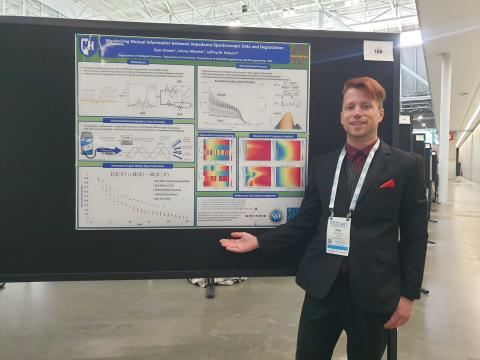Ryan Brown's Academic Journey: Bridging Chemistry, Education, and Neuroscience

BIO-SENS student Ryan Brown received one of five poster awards from the Society of ElectroAnalytical Chemistry at PittCon in March 2025. This student competition award is given annually, and Ryan is one of the few undergraduates to have won it. Pittcon, the Pittsburgh Conference on Analytical Chemistry and Applied Spectroscopy, is an annual event that highlights advancements in chemistry, spectroscopy, and analytical instrumentation.
Ryan is a student in Professor Jeffrey Halpern’s Surface Enhanced Electrochemical Diagnostic Sensors (SEEDS) Lab at UNH. Electrochemical biosensing, a technique that uses electrical signals to detect biological molecules, is a key focus of their research. Through the BIO-SENS project, scientists at the SEEDS lab are developing a novel biosensor that can continuously monitor conditions during the biomanufacturing process. This project is a collaborative effort with research teams from the University of New England, Auburn University, and the University of Wyoming.
Ryan has always been enthusiastic about science education. He earned his bachelor’s degree in chemistry from the University of California at Irvine in 2013, with a focus on education. He completed his master's in teaching soon thereafter. For nine years, he taught middle and high school students in subjects ranging from environmental science to zoology. Motivated by personal family experiences, Ryan decided to shift his focus to neuroscience, where electrochemical sensors play a crucial role in advancing the field. His time in the SEEDS lab has broadened his perspective, and he is now pursuing a second bachelor’s degree in Neuroscience and Behavior, and is set to graduate in May 2025. He will be joining Washington University in the fall, pursuing his PhD in biomedical engineering.
Support for the NH EPSCoR Bio-Inspired On-demand Strategies for Engineering Nanostructured Sensors (BIO-SENS) Project is provided by the National Science Foundation's Research Infrastructure Improvement Award #2119237.
